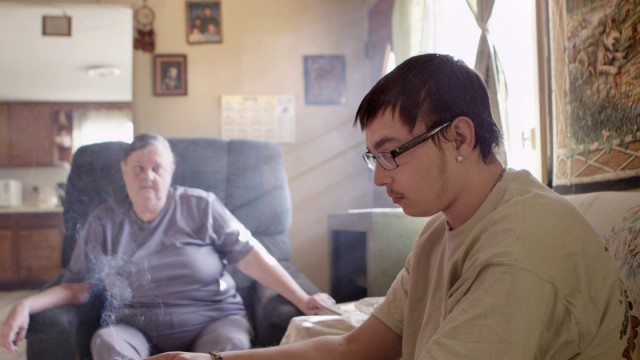In the opening scene of Rich Hill, Andrew states the film’s thesis: “People around town, they walk toward us or walk past us, with their nose 50 miles in the air, acting like their shit don’t stink and acting like they’re better than us. And, I don’t fall for that. We’re not trash. We’re good people.” This statement comes after a montage of full-colored Everyday Americana was interrupted by de-saturated shots of abandoned and derelict buildings. A single shot of a city limit sign announcing “Rich Hill, Population 1,396” is the most context that Rich Hill gives to its portrait of poverty.
Following Andrew, Harley states that he’s easily triggered while he tapes up his hockey stick in the middle of a cluttered living room. Harley has an anger management problem, knows that he does, but doesn’t know what to do about it. This opening montage concludes with Appachey, the youngest of the group walking through a junk-filled yard while stating that people expect so much of him, but he doesn’t even know what to do anymore.
The film that follows presents the life of these three kids living in a state of poverty, but presents them with as little social context as possible. Rich Hill hopes that people will look at the life of these families with a compassionate eye, but allows people to judge the characters without a larger world context. If the thesis statement of Rich Hill is that poor people are people too, it adds little substance beyond that thought.
12-year-old Appachey lives in a dirty house led by a frazzled and angry single mother. Appachey’s mom makes a meager wage, and is bitter because she got pregnant at the age of 16, kicked out of her house, and forced to grow up instead of experiencing youth. She has few life skills and can barely manage her family, receiving little help from her children. Instead, she hurls obscenity-laden orders and insults at them, losing her temper at every possible instance. Growing up like this, Appachey suffers bouts of depression and isolation, having to repeat the sixth grade.
15-year-old Harley is an angry young man living with his grandmother who struggles to deal with Harley’s constant outbursts. Harley is ripped straight from the newspaper headlines, as his mother was convicted of attempted murder when she shot her husband because she found out that her husband molested Harley. Now, because she is in jail, Harley has to deal with the pain of molestation without his mother, and is mainly treated through medication rather than therapy.
13-year-old Andrew is the brightest bulb of the bunch. A happy-go-lucky sort who found Jesus, he is intelligent enough to come to the defense of his family while knowing they’re not making the best decisions. His good-natured but shiftless father roams from city to city in an attempt to get rich and performs as a Willie Nelson imitator. Andrew attempts to remain positive, despite having to bathe in water heated by various electrical implements because the gas in the house has been shut off.
These three family situations are presented without a broader than the one they themselves can perceive. There are no tangents about how good therapy is hard to find, whether health insurance is helping or hindering the family, pointing out that rampant unemployment still ravages the country even as the economy was getting back on track, noting the state of family planning funding, the state of sex education in Missouri, inflation rates or stagnant wages. Rich Hill simultaneously wants the viewer to come with a clean slate to the humanity of these characters, but also to bring their world knowledge to the table as we view poor people living life.
The crux of the issue is that Rich Hill wants us to see these people as humans rather than losers, but constantly highlights the repeated mistakes they all make. These characters could be seen as sympathetic characters, failures of the system, or victims of their own devices. Rich Hill wants to be a Frederick Wiseman-style fly-on-the-wall documentary, but the choice of subjects and inability to engage them causes it to be closer to Gummo.
Godard has two quotes, “Film is truth at 24 frames per second” and “Every edit is a lie.” With documentaries, these two concepts get placed in sharp focus. The mere presence of the camera changes a person, and every edit in a documentary sells the filmmaker’s truth. In Rich Hill, the camera takes on a secondary presence; the kids start talking to and at the camera, pontificating on their life in a sort of documentary-induced performance. As the camera changes reality, there are a hell of a lot of edits leaving out a whole hell of a lot of contexts.
The remaining product is a necessary look at an aspect of modern life that people frequently want left under the rug. But, by shining the light without external contexts, the filmmakers gives anybody the right to use these stories however they want. These stories could become empathetic “consider the children” pleas for better schooling and health care, or bootstrappy “they do it to themselves” arguments to take away social welfare. By pointedly eschewing either of these paths, Rich Hill ends up being a perverted and voyeuristic look into the lives of three kids struggling with the hands they’ve been dealt. This is poverty porn at its most vacant.

